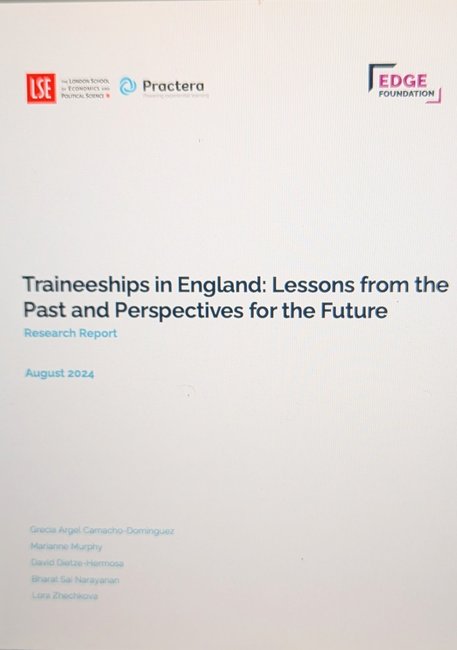Students from LSE took part in a two-week project exploring the ‘traineeships’ policy for the Edge Foundation, organised through Practera. These are their reflections on the project...
Educational policy is crucial for preparing young people for the world of work. As current students, we are particularly sensitised towards the challenges of both modern education systems and the current labour market. So we were eager to participate in a two-week policy research project, organised by Practera and the London School of Economics, to explore the future of traineeship policies in the UK with the Edge Foundation. Here, we reflect on the lessons learned.
In our increasingly polarised global economy, addressing youth unemployment and skill deficits has never been more critical. Traineeships, or pre-apprenticeships, are designed to tackle these issues by providing youth with a combination of valuable work experience and basic skills training. In England, the traineeship programme was first launched in 2013, primarily targeting young people aged 16-19. However, despite its potential, the programme faced challenges, including low uptake and limited funding. This led to its withdrawal in 2022. As the newly elected Labour government signals a commitment to reintroducing pre-apprenticeship schemes, our research explores how we can successfully revitalise traineeship programmes by learning from comparable international models and England’s previous experience.

A core finding is the need for a stakeholder-friendly approach to policy design. This begins with consultation – actively engaging with stakeholders across business, industry and education to ensure that traineeships are aligned with current labour market needs. This alignment can only be achieved through cross-sectoral collaboration, involving not just the Department for Education (DfE), but also the Department for Work and Pensions (DWP) and the Department for Business and Trade (DBT). Traineeship curricula should be flexible and designed with direct input from employers to ensure that participants gain the relevant skills needed for apprenticeships and entry-level positions.
In recent years, an increase in full-time education has led to declining traineeship participation. This trend highlights the need to shift the focus from the quantity of traineeships to quality. Rather than simply aiming for higher numbers, the success of traineeship programmes should be measured by completion rates and long-term outcomes. It is also essential to develop a clear quality assurance framework. Providers should maintain strong oversight, while both trainees and employers should receive hands-on support throughout the process. Additionally, increasing awarenessthrough efficient career guidance in schools, improved access to information online and on social media, and promoting success stories can help position traineeships as an attractive route to employment.

Lastly, we believe that for traineeships to have a long-term impact, they must be integrated into a broader vision of comprehensive educational reform. This includes refocusing apprenticeships on 18-24 year-olds to ensure that traineeships can open the doors for young people to progress towards advanced learning opportunities and, eventually, full-time employment. As aspiring policy practitioners, working with Edge was particularly enlightening. We gained firsthand knowledge of the issues facing policymakers, as well as those who influence policy from outside the government. What made this project even more meaningful was knowing that the work we did as student consultants had a direct contribution to the work and mission of the organisation.
In light of the current struggles with youth unemployment and the substantial skills deficits facing the economy, the topic of traineeships felt particularly relevant. Edge’s team was friendly, open and supportive throughout the research process. This project has also convinced us of the value of traineeships as a pathway to apprenticeships, meaningful employment, and further education. However, as previous experience with traineeships demonstrates, merely reintroducing the policy will be insufficient to effectively address youth unemployment and skills deficits. While traineeships can clearly benefit both young people and the economy, the programme must be crafted carefully to ensure its responsiveness to the needs of the labour market and the provision of high-quality opportunities for youth. This is especially true for those young people who fall outside the traditional pathways to success, but who also deserve a chance.
By Lora Zhechkova, Grecia Argel Camacho-Dominguez, Marianne Murphy, David Dietze-Hermosa, Bharat Sai Narayanan..
These are all students from the LSE who took part in a two-week project exploring the ‘traineeships’ policy for the Edge Foundation, organised through Practera

